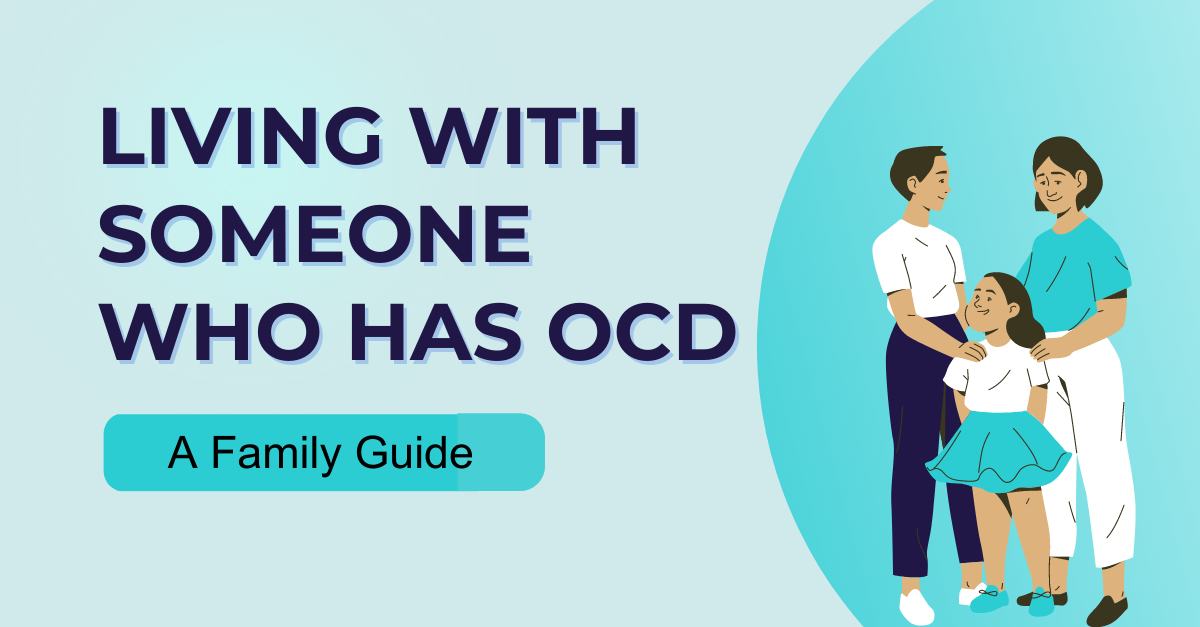August 3rd, 2022

Mental illness affects over 50 million adults in the United States alone. A healthy balance of therapy, medication, and support can help these individuals live happy, successful, and productive lives. As a family member of someone with a mental health diagnosis, you play an integral role in the healing and recovery process. You’re probably the first person your loved one turns to for support, advice, and motivation.
Obsessive-Compulsive Disorder (OCD) is a common disorder that affects as many as 3 million adults. If your loved one was recently diagnosed with Obsessive-Compulsive Disorder you may need help navigating the obsessive thoughts and compulsive behaviors that accompany this condition.
In this article, we’ll offer advice and tips for family members living with someone with OCD. By understanding their OCD diagnosis and the difficulties they face, you can offer the type of support they so desperately need.
They say admission is the first step to recovery. In some cases, your loved one may not even realize they have OCD. It may take you noticing and pointing out their troubling behaviors for them to admit they have a problem. But before you try to diagnose your family member or jump to conclusions, it’s important for you to know the most common signs and symptoms of OCD.
These include, but aren’t limited to:
Some of these symptoms may also be signs of a different mental health disorder like depression or bipolar disorder. Be sure to speak with both your loved one and a medical professional before starting a treatment or coming to any conclusions. Once you confirm an OCD diagnosis, you can explore your options including online treatment programs, group therapy, and medication.

If you’ve never dealt with OCD first-hand, it can be difficult to understand and sympathize with your family member’s obsessive need to perform certain routine behaviors. You may get frustrated by their obsessive thoughts, worries, and fears. One of the best ways to support a loved one with OCD is to remain patient, encouraging, and flexible.
Avoid having high expectations for how they’ll handle a specific situation. Some days will be better and easier than others. If your family member is having a particularly hard day, try to be encouraging. Instead of lashing out with comments like, “Just get over it”, try something like this – “I can see that you’re having a rough day and that’s understandable. What would make you feel better?”
Remember that change of any kind is extremely stressful for someone with OCD – even seemingly positive changes. Validate their feelings instead of downplaying them. Adjust your expectations and keep in mind that these setbacks are not permanent.
Everyone’s healing process and journey look different. Avoid comparing your loved one’s progress to anyone else. They might overcome their OCD symptoms faster or slower than others. They may also experience more setbacks or relapses than someone else with the same condition. Similar to changing your expectations regarding their behavior, it’s important to have realistic expectations about their recovery as well.
A common misstep of family members living with someone with OCD is to mention how life was before the diagnosis. Avoid saying things like, “Remember when you didn’t worry so much about getting sick?” or “I miss being able to leave the house without you checking the door lock 20 times.” These statements are discouraging, hurtful, and could cause a setback in your loved one’s recovery.
Even making small comparisons from one day to the next can be harmful to your family member’s self-esteem and progress. Don’t compare one day to the next or point out their “slip-ups”.
Remember, they’re already practicing negative self-talk. The last thing they need is for you to confirm their suspicions that they’re a disappointment. This is especially crucial for people with OCD that’s associated with a constant need for approval and reassurance.

Just as harmful as criticism or comparisons can be for someone with OCD, your compliments, praise, and acknowledgments of positive changes can do wonders for your loved one’s recovery and state of mind. One of the biggest complaints of people with OCD is that their family members don’t understand how hard it is to make even small improvements. For example, washing their hands 3 times instead of 5. This is a big step for your loved one and it’s important that you recognize it and encourage them.
Offer plenty of praise and be specific with your compliments. Say something like, “I noticed you only washed your hands three times all day! That’s two less than yesterday. You should be really proud of yourself. I’m proud of you.”
Some people with OCD struggle to acknowledge their accomplishments. When you point them out, you’re helping boost their confidence and their belief that they can overcome their diagnosis.

Living with someone with OCD isn’t all about walking on eggshells. Your family member still needs to be held accountable for their behavior. That’s why you need to set healthy boundaries while also being sensitive to their needs and struggles.
Make a plan together that involves reducing negative thoughts and decreasing compulsions. By setting clear boundaries, it eliminates confusion and frustration for your loved one. A few suggestions include:
You should also discuss how your family member’s compulsive behavior and thoughts impact the family’s ability to perform daily tasks, responsibilities, and activities. Your life shouldn’t be dictated by your loved one’s condition, but you also need to be sensitive to their needs. It’s about creating a balance that works for all those involved.
Be conscious of your family member’s good and bad days. Understand that your mood may dictate your loved one’s mind frame and ability to resist compulsions and divert certain obsessive thoughts. Respect your family member’s need for space and distance (unless there is the risk of imminent harm).
The best results occur when these parameters are discussed beforehand, not mind-conflict. The main objective is to limit how much your family accommodates these OCD behaviors while also offering encouragement, support, and understanding.
OCD doesn’t just affect the diagnosed individual. Many of the behaviors, thoughts, and compulsions associated with this disorder directly affect family members and loved ones. That’s why you need support too!
Knowing how to navigate your loved one’s condition while offering a balance of empathy and accountability can increase their chances for success. It will also help create harmony and balance in your household.
At Clarity Clinic, we have highly trained staff who specialize in therapy and psychiatry services. To learn more about how we can support your mental health, call Clarity Clinic at (312) 815-9660 or schedule an appointment today.
Our Services
Virtual/Online CarePHP and IOPAdult PsychiatryChild & Adolescent PsychiatryAdult TherapyChild & Adolescent TherapyCouples CounselingFamily TherapyGroup TherapyPsychological TestingTranscranial Magnetic Stimulation (TMS)